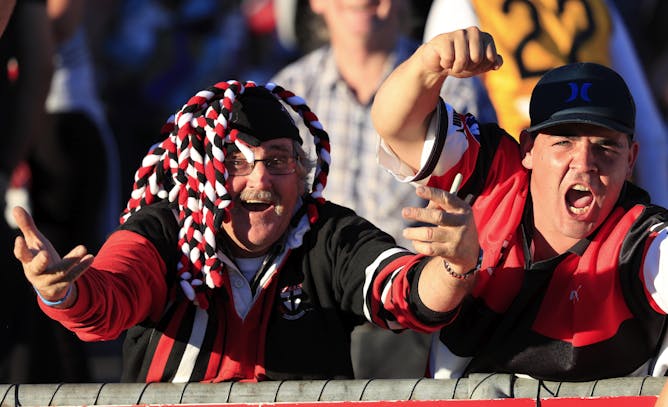|
|
|
Editor's note
|
|
Barracking has a long history in Australian rules football. When the sport started to gain a mass following in the late 1800s, its supporters became notorious for their passionate jeering, yelling and profane outbursts during matches. One early football official described barracking as the “delightful privilege of abusing umpires”.
As Matthew Klugman writes, however, barracking took an ugly turn in the 1980s, with the racial vilification of players. This season, the AFL has taken action to try to control unruly barrackers, prompting anger and mockery. Barracking should remain a part of the game, Klugman says, but in a way that neither threatens nor vilifies others.
This weekend marks 30 years since Australia first connected to the global internet. But, as Justin Zobel writes, things were very different – and a lot slower – online then. It took several technological leaps to give us the online experience we enjoy today.
The internet of 1989 is thankfully consigned to the distant past. But if you want to help secure the future of expertise-driven journalism on the web, please make a donation today.
|
Justin Bergman
Deputy Editor: Politics + Society
|

|
|
Top story
|

The AFL quickly retreated on its deployment of Behavioural Awareness Officers to monitor unruly fans. But who should be making sure spectators don’t get out of control?
Rob Blakers/AAP
Matthew Klugman, Victoria University
Barracking has been a colourful and controversial part of Australian Rules football since the game's inception. Now, the AFL is trying to maintain order – and fans are irate.
|

Out of the science labs, our internet connectivity is now part of our everyday lives.
Shutterstock/AngieYeoh
Justin Zobel, University of Melbourne
In just three decades we've gone from a very limited internet connection in Australia to now sharing our lives online.
|

The proposed 3 stage tax plan will cost $158 billion.
Shutterstock
Michelle Grattan, University of Canberra
The government's proposed income tax cut plan has put Labor into a bind and Pauline Hanson into a hissy fit.
|
Business + Economy
|
-
Dr Violetta Wilk, Edith Cowan University
A blue boat shed in Perth, Western Australia, shows the power of social media and the rise of unpaid influencers in marketing.
-
Richard Holden, UNSW
Australia's treasury adopted a well-being framework well before New Zealand's much celebrated "well-being budget". Here's what happened to it.
|
|
Arts + Culture
|
-
Helen Vatsikopoulos, University of Technology Sydney
As we face a growing tide of unregulated hate speech, the media is crucial in normalising diversity. Yet progress here has been slow. Even the ABC has failed to meet some of its own targets for hiring a diversity of employees.
-
David Larkin, University of Sydney
An Australian Chamber Orchestra concert features works by Jonny Greenwood, Sufjan Stevens and The Nationals' Bryce Dessner, along with those of modern Polish composers.
|
|
Education
|
-
Michael Luckman, La Trobe University; Andrew Harvey, La Trobe University
A recent Productivity Commission report showed the demand driven system of university funding didn't increase participation rates for Indigenous students. But our analysis actually shows the opposite.
-
Kellie Bousfield, Charles Sturt University
Governments usually measure outcomes by standardised tests, such as NAPLAN. If schools are scrambling to improve their outcomes to gain funding, this can have a detrimental effect on teaching quality.
|
|
Health + Medicine
|
-
Eileen Baldry, UNSW; Chris Cunneen, University of Technology Sydney
Children are still being held in police cells and juvenile detention for low-range offences, under alarming conditions. Here's how their mental health and future prospects suffer.
|
|
Environment + Energy
|
-
Alyssa Weinstein, Australian National University
You can barely communicate with your kids, but these creatures are sending complex interspecies instructions.
-
Paul Humphries, Charles Sturt University; R. Keller Kopf, Charles Sturt University
Federal environment minister Sussan Ley said the environment doesn't necessarily need all its water, whereas farmers do. But denying rivers even part of their water can harm their health in many ways.
|
|
Cities
|
-
Neema Nassir, University of Melbourne
A lack of convenient public transport is one of the main disadvantages of life in the outer suburbs. Driverless vehicles, by halving the cost of bus services, are ready to fill the gap.
-
Jenny Donovan, La Trobe University
Promoting the benefits of breastfeeding isn't enough when uncomfortable and uninviting public places deter mothers. Places that help them feel comfortable breastfeeding have several key features.
|
|
Politics + Society
|
-
Michelle Grattan, University of Canberra
Following similar comments by Deputy Prime Minister Michael McCormack, a senator has called for the ABC to sell its Ultimo headquarters and move to the suburbs and regional centres.
-
Michelle Grattan, University of Canberra
Bernardi said that at the election his Australian Conservative party polled “a tiny fraction of the votes” required. He said potential voters returned to supporting the Coalition under Morrison.
-
Amy Maguire, University of Newcastle
Families of the 298 victims may, at last, see justice after five years.
-
Gerhard Hoffstaedter, The University of Queensland; Sara Riva, Griffith University
Current responses to the world's refugee crisis are inhumane and ineffective. We propose five ways forward to help the world's most vulnerable people.
-
Andrea Carson, La Trobe University; Matthew Ricketson, Deakin University
A recent survey found Australian news consumers are the 'lightest' news consumers out of 38 countries, use fewer sources to access news and are more likely to subscribe to Netflix than news.
|
|
Science + Technology
|
-
Terry Goldsworthy, Bond University
Australians should be concerned about any shift to an intelligence model that is based on the introduction of greater powers on the one hand, and less oversight and governance on the other.
-
Alina Donea, Monash University
It's true that here on Earth, if you want to burn something you need oxygen. But the Sun is different. It is not burning with the same kind of flame you would have on Earth if you burned a candle.
|
|
| |
Featured jobs
|

|
University of Western Australia — Mount Waverley, Victoria
|

|
University of Melbourne — Parkville, Missouri
|

|
Griffith University — Brisbane City, Queensland
|

|
La Trobe University — Melbourne, Victoria
|
|
|
|
| |
| |
| |

|
| |
| |
| |
Featured events
|

|
Monash University Law Chambers, 555 Lonsdale Street , Melbourne, Victoria, 3000, Australia — Monash University
|
|
|
Law School Foyer, Sydney Law School, Eastern Avenue, University of Sydney, Camperdown, New South Wales, 2006, Australia — University of Sydney
|

|
The University of Sydney, Sydney, New South Wales, 2006, Australia — University of Sydney
|

|
The University of Sydney, Sydney, New South Wales, 2006, Australia — University of Sydney
|
|
|
|
| |
| |
| |
| |
| |
|
|
|
|
|
|
|